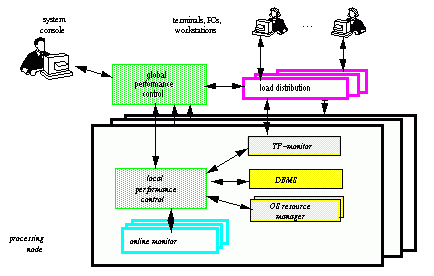Duration
Description
Performance control in today's database and transaction systems is a complex and largely manual task requiring highly skilled administration personal. Furthermore, manual tuning activities are time-consuming making it difficult to maintain good performance under changing workload and systems conditions. Reducing these problems and simplifying system administration requires a largely automatic and self-tuning approach to performance control. To this end, we pursue a so-called goal-oriented performance control which aims at automatically enforcing external performance goals like response time restrictions. If these goals are about to be missed performance control automatically analyses dynamically gathered monitoring data in order to determine the underlying bottleneck. Furthermore, control parameters are automatically adapted in order to improve performance and to meet the goals.
Our approach is applicable to local and distributed TP systems by utilizing local and global control components. Local performance control monitors processing and adapts control parameters (multiprogramming level, priorities etc.) within a single processing node. Furthermore it tries to coordinate scheduling components of the operating system, TP-monitor and the DBMS. Global performance control addresses performance problems that could not be solved locally. It adapts global control strategies, in particular for transaction routing, e.g., to cope with overload situations. The Figure shows the gross structure of the control approach.
We have developed a detailed simulation model in order to evaluate and compare various strategies for automatic bottleneck determination and bottleneck resolution. So far we have concentrated on the central case (local performance control).

Master theses:
- Wagner, R.: Simulative Bewertung von zielorientierten Lastkontrollverfahren, Sep. 1995
- Krink, G.S.: Simulation von adaptiven Lastkontrollverfahren zur Transaktionsverarbeitung. April 1994




